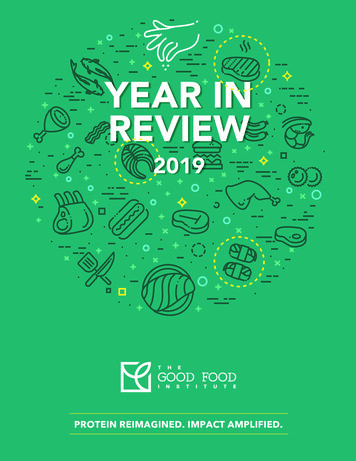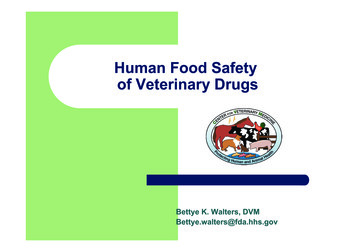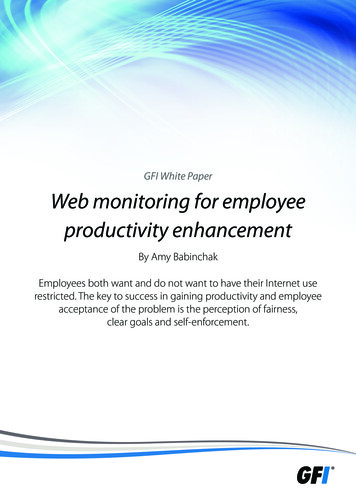
Transcription
2019PROTEIN REIMAGINED. IMPACT AMPLIFIED.
Dear Friends,YOURIMPACTAMPLIFIEDI support GFI becausethey embody the greatestimpact coupled with thehighest integrity. They arecreating a global foodrevolution by bringingtogether and advisingscientists, entrepreneurs,investors, and governmentofficials.”—CAMERON ICARD,BOARD MEMBER, DONORWithout imagination, we cannot see beyond the status quo. Without focusing onimpact, we cannot change the status quo.Bold imagination and a commitment to driving change unify The GoodFood Institute’s visionary donor family, our tireless team, and the paradigmshifting scientists, policymakers, students, investors, corporate executives, andentrepreneurs we support.Together, we are building a sustainable, healthy, and just food system.The year 2019 saw stunning developments across plant-based and cultivatedmeat. Plant-based meat took fast food by storm. The world’s largest meatproducers added plant proteins either to their product lines or to their investmentportfolios. The Indian, European, Japanese, and Singaporean governments beganfunding cultivated meat research. The Food and Drug Administration (FDA)and the U.S. Department of Agriculture (USDA) announced a joint regulatoryframework, bringing cultivated meat a step closer to our tables.Our second annual Good Food Conference convened global food conglomeratesand startups, corporate venture arms and impact investors, life sciencecompanies and university researchers, and government officials and students.With so much creativity and capacity for impact at the same table, significantprogress is often just a connection or conversation away.This year in review highlights the progress GFI’s donor family, advisors,volunteers, and team have made in fostering a collaborative scientific ecosystem,securing government support and fair regulation, and growing protein innovationin the United States and around the world.Indeed, 2019 marked our most ambitious, impactful year to date, and we haveour extraordinary donor family to thank. GFI’s work is possible only due toyour daring vision and commitment to this theory of change. Your support ofGFI radiates across the entire ecosystem and around the globe. You imagine afuture of nourishment, abundance, and compassion. Together, we are creatingthat future.With gratitude and heartfelt optimism,Bruce FriedrichCo-founder & Executive Director22019 Year in Review
YEAR IN NUMBERSWHAT’SINSIDE04GFI at a Glance5GFI international teams instrategic, high-impact markets14open-access research projects fundedthrough GFI’s Competitive ResearchGrant Program06Milestones08Science andTechnology300 meetings with food manufacturers,retailers, and foodservice providersabout growing the plant-based market900 scientists, entrepreneurs, investors,policymakers, and companies at the2019 Good Food Conference toaccelerate alternative proteins10CorporateEngagement12Policy148,330 media hits, quotes, and op-eds tobuild public enthusiasm for alternativeproteins and shape the policy debate1,915,477 views of Executive Director BruceFriedrich’s TED talk about plant-basedand cultivated meat, which elevated thisgame-changing sector in 25 languagesGFI Aroundthe World18Good FoodConference4 years as an ACE Top Charity“Our impression, from a variety of sources, is that GFI has beeninvolved in one way or another in a large portion of the majordevelopments in the plant-based and cell-cultured meat sectorssince their founding. . There are few charities working in thisarea, and GFI has shown strong leadership and efficiency.”gfi.org3
GFI AT A GLANCEGFI is a nonprofit working to create a sustainable, healthy,and just global food system. Plant-based, cultivated, andother alternative proteins offer a better way to feed the world.The Challenge:A paradigm shift ishappening right nowin how we make foodchoices, and GFI isfinding the solution for asustainable food supply,which will improve theenvironment and animalwelfare.”—STEVE BECUTI, DONORCurrent meat production is unsustainable and inefficient. It is a keydriver of climate change, environmental degradation, and antibioticresistant disease.Yet these facts have not sparked significant behavior change:People are eating more meat than ever in the United States andaround the world.GFI’s Solution:We can create meat from plants or cultivate it directly from cellsmore sustainably and efficiently.We will make more progress by changing the default choices thanby trying to change every single person’s mind.GFI is accelerating the transition of the global food system to alternativeproteins by making them more delicious, affordable, and accessible thanconventional animal products.Our Programmatic Priorities:SciTech: Bridging gaps in scientific research, funding, and talentacross the alternative protein sector.Corporate Engagement: Helping the food industry and investorcommunities put delicious, affordable alternative proteins on everymenu and in every food retailer.Policy: Advancing government investment in sustainable proteinsas well as fair regulation and legislation.GFI works around the world with team members based in the UnitedStates, Brazil, India, Europe, Asia-Pacific, and Israel. We engagecompanies across the supply chain—from startups to legacy meat andfood conglomerates, major chain restaurants, and retailers—as well asindividual scientists, policymakers, investors, and entrepreneurs.42019 Year in Review
Maximizing Our ImpactWe share knowledge freely. In a field where many innovators seek novel solutionsto the same set of problems, GFI’s research, data, and insights are open-access andsupport the progress of every innovator in this space.We focus on the white space. GFI advances high-impact, tractable solutions inareas where too few people are working.We take a big-picture perspective. GFI works across the plant-based andcultivated industries, the public and private sectors, and international borders, aswell as into future decades. We spot and address today’s industry-wide challenges,and we forecast and avert obstacles.The Alternative Protein LandscapePlant-based meat, eggs, and dairyare produced directly from plants.Like animal products, they compriseprotein, fat, vitamins, minerals,and water. Next-gen plant-basedoptions look, taste, and cook likeconventional choices.Cultivated meat is produced directlyfrom animal cells. Meat cultivationfacilitates the same biological processthat happens inside an animal byproviding warmth and the basicelements needed to build muscleand fat.Ingredients produced viafermentation are also used tomake alternatives to legacy meat,eggs, and dairy. Microorganismsare programmed to produce specificanimal proteins or fats duringfermentation, or microorganisms’own high-protein biomass is used.Alternative proteins do not rely on conventional animal agriculture. Their production,therefore, requires far fewer natural resources, causes much less pollution, needs noantibiotics, and eliminates farm animal suffering. Protein innovation opens up a worldof opportunity for flexibility, resilience, and justice in our global food system.Top: (left to right) Impossible Burger sliders, Shiok Meats’ cultivated shrimp, fermentation tanks. Bottom: GFI staff explore a sustainable farm at the 2019 fall staff retreat.gfi.org5
MILESTONESGFI donors empowered us to advance alternative protein scienceand support industry development. Together, we go further, faster.This is impact amplified.MarchThe USDA and FDA announce jointoversight of cultivated meat, a momentousstep that brings cultivated meat closer tomarket. (Page 12)JanuaryThe world’s first massive openonline course on alternativeproteins hits the web, courtesyof the GFI SciTech team.(Page 9)Inspired by consultation with GFI’scorporate engagement team, MorningStarFarms commits to making their productline 100 percent plant-based by 2021. Thiswill eliminate 300 million eggs from thesupply chain annually. (Page 10)With the support of GFI Brazil, the largestegg producer in Brazil launches a plantbased egg product: N.Ovo. (Page 15)FebruaryThe Indian governmentannounces plans to establish theCentre of Excellence in CellularAgriculture for cultivated meatresearch in partnership with GFIIndia. (Page 16)Alternative protein science getsan infusion of 3 million forcritical open-access researchthrough GFI’s inauguralCompetitive Research GrantProgram. (Page 8)62019 Year in ReviewMayGFI’s state of theindustry reports forplant-based foods andcultivated meat providethe first in-depthdescription and analysisof the alternativeprotein investmentlandscape. (Page 11)AprilGFI India helps secure a 640,000 grantfrom the Indian government for cultivatedmeat research—one of the largestinvestments in cultivated meat researchever made by a government. (Page 16)GFI’s Sustainable Seafood Initiative andGood Food Startup Manual are honoreesin Fast Company’s 2019 World ChangingIdeas awards. (Page 11)Bruce Friedrich brings alternative proteinsand food technology to the TED stage.(Page 19)
Driven by a sense of urgency to mitigate the impact of animalagriculture on sustainability, climate change, and global health,[GFI’s] main priority is to foster and support innovation in thealternative protein field. . The vast majority of entrepreneurshave told us time and time again how important GFI has been ineliminating many of the challenges of establishing their startups.”—AGFUNDER NEWSJulySeptemberGFI, the ACLU, andALDF sue the state ofArkansas on behalf ofTofurky to overturn itslabel censorship lawas unconstitutional.(Page 13)JuneCultivated meat startups,scientists, and stakeholders—including Merck and GFI—formthe Cultivated Meat ModelingConsortium. (Page 8)Food Technology, thetrade publication for theworld’s largest body of foodtechnologists, publishes“Formulating with AnimalFree Ingredients” by GFI foodscientist MJ Kinney. (Page 8)In response to GFI lobbying, Congressaffirms support for funding alternativeprotein research in the U.S. government’sfiscal 2020 agricultural appropriationsreport. (Page 13)More than 900 industry experts gatherin San Francisco at the 2019 Good FoodConference. (Page 18)AugustLeading Israeliuniversities HebrewUniversity and theTechnion work with GFIIsrael to add alternativeprotein courses to their2020 curricula. (Page 14)GFI Europe incorporatesin Belgium and beginsestablishing operationsacross the continent.NovemberGFI India hosts The Futureof Protein Summit inpartnership with HumaneSociety International andthe Government of India’sMinistry of Food ProcessingIndustries. (Page 16)OctoberGFI director ofpolicy Jessica Almymakes the caseagainst governmentcensorship of plantbased food labelsat the Wall StreetJournal’s Global FoodForum. (Page 13)DecemberThe district judge inour Arkansas labelcensorship lawsuitblocks Arkansasfrom enforcingplant-based labelcensorship whileour lawsuit ispending. (Page 13)(Page 14)gfi.org7
In the NewsSCIENCE ANDTECHNOLOGYYou want to build a just food system.We’re laying the foundation.A strong open-access research environment and talent pipeline arecritical to fostering good food innovation. Gifts from GFI supportersenable GFI SciTech director David Welch and his team to identifyand bridge gaps in research, funding, and talent for the alternativeprotein sector.Identifying Technological BottlenecksGFI scientists map the technological landscape and forecast thesector’s trajectory to determine the most important white spaceopportunities. We share these learnings broadlythrough trade publications, white papers, andspeaking events. In 2019, we published articlesin Chemical Engineering Process Magazineand Food Technology, the trade magazine forthe world’s largest body of professional foodtechnologists. We also published a white paperon decreasing the cost of cell culture media. Inpartnership with Merck KGaA, MosaMeat, andothers, we helped launch the Cultivated MeatModeling Consortium to accelerate problemsolving through computational modeling.Eliminating ObstaclesCompetitive ResearchGrant ProgramIn February, we announced the 14 recipients of our inauguralCompetitive Research Grant Program, 11 of whom had not previouslyconducted plant-based or cultivated meat research. The first yearof this program more than doubled the open-access cultivatedmeat research funding of the past 20 years. It represents the largestinfusion of grant money for plant-based meat research ever.Companies have reached out to grant recipients requesting to applytheir research findings. One of the world’s largest cultivated meatcompanies will test growth factors developed by one of our grantees.The second round of our grant program has expanded the researchareas and pool of available funding. We received high-impactproposals from 135 applicants across 25 countries. We will fund 12 to18 of these projects.82019 Year in ReviewHaving identified which areas of innovation aremost critical, GFI scientists engage experts andinstitutions to catalyze open-access researchand early-stage commercialization. We seededalternative protein R&D with nonprofits,universities, and government agencies—bothdomestically and internationally. We collaboratedwith university researchers to submit a 10Mproposal to the USDA and a 6M proposal tothe UK government for plant-based-meat cropresearch. GFI scientists advocated alternativeprotein research at the Foundation for Foodand Agriculture Research, ClimateWorks, theInstitute for Protein Design, the National ScienceFoundation, and many more.Our SciTech team worked across the investmentcommunity to increase the capital flowing intothis space. We helped Purple Orange Venturesestablish a funding program offering grants of 120,000 EUR to recruit entrepreneurial scientistsinto the sector. We explained alternative proteinsto a wide range of investors, including the venturearm of a multinational automation and roboticscompany, CleanTech Investment Banking, and agroup of 35 institutional investors managing atotal of 11.5 trillion in assets.We continue to bring life science and techcompanies into this sector. In 2019, our scientistsTop Right: Director of Science & Technology David Welch, Ph.D., speaks at the Asia-Pacific Pea and Soy Protein Processing Region Tour 2019.Left: GFI research grantees present at the 2019 Good Food Conference.
Alt-Meat Trounces Animal Meat’sMassive InefficienciesBy Dr. Liz Specht“While the planet arguably benefits the most fromthese meats’ higher production efficiencies, themarket efficiency gains will be hugely beneficial forthe bottom line.”We don’t have to give up burgers toaddress climate change. We just haveto give up the cows.By Dr. Liz Specht“By changing how we produce meat, we cantransform the meat industry from a leading cause ofglobal warming to the main tool for mitigating andeven reversing climate change.”Tomato tuna anyone? Plant-based meathas moved into the seafood aisle“If you can give consumers everything that theylike about fish but do it with plants, it’s goingto be 10 times as efficient and significantly lesspolluting.”—Bruce FriedrichGFI’s research grants areenabling fundamentalopen-access science. That,in turn, enables scalabilityand an ecosystem approachto accelerating this spacein ways the private sectoralone cannot.”—MAX ELDER, INSTITUTE FOR THE FUTUREshared their expertise with many national and multinationalcompanies—including Mitsubishi, 3M, and GE Healthcare—and conducted full-day workshops at various life sciencecompanies. We supported internal project developmentrelevant to cultivated meat at a global life sciencecompany, a protein engineering research institute, and amultinational chemicals company.Deepening the Talent PoolGFI’s SciTech team is building a robust, collaborativecommunity of researchers and fostering the next generationof protein innovators. We reached thousands of scientiststhrough targeted speaking engagements, including atthe International Life Sciences Institute, the EngineeringBiology Research Consortium, and the National Academiesof Science, Engineering, and Medicine. We also spoke withundergraduate and graduate students at top universities,including Princeton, Stanford, UC Berkeley, WageningenUniversity in the Netherlands, and Shenzhen University inmainland China.The SciTech team developed and published a wide suiteof introductory resources to support innovators, scientists,and students in exploring this sector. We launched a nocost online course (see right), published a long-form Redditseries on the science of meat cultivation, and developed analternative protein resource guide for university students.New Meat: A MassiveOpen Online CourseAfter our collaborations with Stanford and UCBerkeley to establish courses on alternativeproteins, we launched GFI’s massive open onlinecourse, which teaches the basics of plant-basedand cultivated meat. More than 3,000 scientists,academics, industry representatives, and othershave enrolled to date. We’ve also begun work onadditional modules that we will roll out in 2020.“GFI was a huge part of my journey. I metAylon from the business development teamin November last year, and he’s the one thatconvinced me to start a company at all. Then Ialso took this massive open online course that GFIproduced that really helped me learn the ropesin terms of how to make alternatives to animalproducts.”—Sri Artham, Hooray FoodsRight: (left to right) Research Fellow Miranda Grizio, University Inspiration Specialist Amy Huang, Food Scientist MJ Kinney.gfi.org9
In the NewsCORPORATEENGAGEMENTYou know collaboration is critical.We’re bringing everyone to the table.packaged goods companies, hosteddiscussions and all-day workshopswith a variety of multinational food andmeat companies, and gave dozens ofpresentations to corporate venture,venture capital, and institutionalinvestor groups.Engaging stakeholders across the forprofit sector is essential to transformingglobal markets. GFI corporateengagement director Alison Rabschnukand her team are galvanizing the foodindustry and investor community toput delicious, affordable alternativeproteins on every menu and in everyfood retailer.Although most of this work is protectedby nondisclosure agreements, we arethrilled to share that our corporateengagement team helped Kroger add aplant-based line to their portfolio.“GFI has been a greatresource—both in helpingus build relationships withpartners in the plant-basedspace and in sharing broadInspiring Investment and Innovationretail market data that hasinformed our decisions.”We built relationships with more than adozen of the world’s leading consumerWe also worked with Perdue to addplant proteins to their product line andinspired MorningStar Farms to maketheir entire product line fully plantbased by 2021, which will take 300million eggs out of production annually.More than 300 entrepreneurs joined ourGFIdeas community to learn from foodindustry experts and make connections—the co-founders of Netherlands-basedRival Foods met via GFIdeas. Welaunched the GFI Investor Directory,which lists investors interested in proteininnovation as well as their typicalinvestment type, stage, and amount.The GFI team also provided additionalearly-stage support, such as pitchdeck reviews and strategic planningdiscussions, to help drive successfulseed rounds.—Gil Phipps, KrogerSustainable Seafood InitiativeGFI’s Sustainable Seafood Initiative addresses innovation and market gaps for plant-based and cultivatedseafood. In 2019, we completed our strategic plan, advocated public funding for seafood innovation, andexpanded our resources for plant-based and cultivated seafood companies.“GFI has been a wonderful partner, not only to my company but all the companies in this space—inresearching the business landscape and helping us to understand where the market is going, inunderstanding the science and how to advance our technology, and in building relationships withinvestors and larger food companies.” —David Benzaquen, Ocean Hugger Foods“GFI, their white papers, their publications, and all the work they do on policy has created suchawareness. That GFI goes across all these categories and now is expanding globally—it has made thedifference in this industry. We’re very thankful for all of GFI’s work.” —Lou Cooperhouse, BlueNalu102019 Year in ReviewTop Right: (left to right) Research Analyst Kyle Gaan, Director of Corporate Engagement Alison Rabschnuk, Foodservice and Supply Chain Manager ZakWeston, and Food Scientist MJ Kinney attend Expo West 2019. Left: Director of Corporate Engagement Alison Rabschnuk speaks at the Culinary Instituteof America. Photo courtesy of the Culinary Institute of America / Victor M. Samuel.
How to Invest in the MeatlessBurger BoomThe New Makers of Plant-Based Meat?Big Meat CompaniesAmericans crave Impossible Burger,Beyond Meat in 2020“We think the plant-based meat category is lookinga lot like how the plant-based milk category lookedabout 10 years ago before almond and soy milk couldbe found in the refrigerated case next to dairy milk.”“When companies like Tyson and Smithfield launchplant-based meat products, that transforms the plantbased meat sector from niche to mainstream.”“2019 was a big year for plant-based meat. It reallyfeels like the tipping point, but it’s just the beginning.We’re in the early days of a major shift.’’—Bruce Friedrich—Caroline Bushnell—Alison RabschnukExpanding Accessibility andAccelerating GrowthWithout GFI and the corporateengagement team, we would betwo, three years behind. Hats off andthank you very much for being suchan incredible part of our success.”We continued to drive accessibility for plantbased foods. Through 80 meetings or calls withfoodservice providers and retailers, we made thebusiness case for plant-based foods and sharedbest practices for marketing, merchandising,and menuing to the mainstream. We advisedexecutives and R&D teams for nationalquick-service restaurant chains and openedconversations with influential foodservicedistributors. We collaborated with Unilever, NewHope Network, the Food Marketing Institute, andOpen Table to create informational webinars.—ERIC CHRISTIANSON, PERDUE FARMSThe GFI team made the case for alternativeproteins at influential forums, such as theNational Restaurant Association’s RestaurantInnovation Summit, the Alternative Protein Show,the Sustainable Foods Summit, and Food & Agat the Intersection Symposium, which FarmersNational Company hosted and 300 productionagriculture representatives attended.We published state of the industry reports forcultivated meat and plant-based meat, eggs,and dairy. The reports illustrate the tremendousgrowth and innovation across the alternativeprotein sector, covering the top companies andinvestors, key U.S. regulatory updates, and thefirst in-depth investment landscape analysisusing custom datasets curated by GFI.GFI’s Sustainable Seafood Initiative and GoodFood Startup Manual were both honorees in FastCompany’s 2019 World Changing Ideas awards.The publication’s senior editor said: “This year’sawards were the most competitive we’ve everhad. Fast Company editors, reporters, and avenerable group of guest judges pored over the[more than 2,000] entries, looking for the ideasthat we felt had the most creative solutions—andthe most potential for impact and scalability.”Driving Evidence-Based ConsumerStrategyIn 2019, GFI conducted 11 consumer research projects to informstrategy across the alternative protein sector. In collaborationwith leading food innovation firm Mattson and with technicaladvising by Memphis Meats, we developed evidence-basedscience communication tools for the cultivated meat industry andidentified “cultivated” as the optimal term for meeting the criteriaof transparency, differentiation, and appeal.We tested consumer acceptance of plant-based and cultivatedmeat in the United States, India, and China, and we published ourfindings in the academic journal Frontiers. Mindlab partnered withus to study consumers’ implicit perceptions of the plant-basedcategory, and we shared our learnings with food professionalsthrough webinars and meetings.Right: Foodservice and Supply Chain Manager Zak Weston visits the Culinary Institute of America.Photo courtesy of the Culinary Institute of America / Victor M. Samuel.gfi.org11
In the NewsPOLICYYou don’t accept the status quo.Neither do we.Plant-based and cultivated meat are clear, highlytractable solutions to the challenges governments wantto address. Under the stewardship of GFI policy directorJessica Almy, GFI defends a fair, competitive market foralternative proteins and advances public investment inresearch and development.Leveling the Playing FieldIn 2019, we vigorously opposed label censorship of plantbased and cultivated products across the United States,defending free speech and fair markets on behalf ofalternative protein manufacturers. (See far right.)At the federal level, GFI urged the FDA to ensure thattheir approach to modernizing standards of identitywould not interfere with the ability of alternative meatand dairy producers to use familiar terms on their labels.We submitted public comments, delivered oral testimony,and met with FDA leadership to advocate that updatedstandards keep pace with innovation.The GFI team met with the USDA Food Safety andInspection Service administrator to discuss the agency’sinvestigation of plant-based meat labels in supermarkets.We learned of the investigation through one of ourFreedom of Information Act requests.Establishing an Efficient Regulatory PathwayGFI has been actively shaping the U.S. regulatory frameworkfor cultivated meat through oral remarks and regulatorysubmissions to the USDA and FDA. GFI met with the USDA’sForeign Agricultural Service to provide an overview ofthe cultivated meat industry, answer technical questions,and establish GFI as a key resource. We arranged a tourof a cell-culturing company’s lab for the U.S. GovernmentAccountability Office, which is preparing a report on federaloversight of cultivated meat.We celebrated a legislative win when the fiscal 2019agriculture appropriations bill was signed into law without aharmful rider that we energetically fought. The rider wouldhave required new regulations and given sole jurisdictionover cultivated meat products from livestock and poultry tothe USDA.Securing Government FundingThe GFI policy team met with congressional staff to shareinformation on alternative protein technologies and advocatefederal R&D funding to support the science behind thesetechnologies. We met with and submitted comments urginginvestment in alternative proteins to White House officials inProtein Policy Around the WorldOur U.S. and international policy teams provided regulators in India, the United Kingdom, Canada, Singapore,Australia, and New Zealand with resources for developing cultivated meat policy frameworks, and we arecautiously optimistic about the development of clear, swift regulatory approval processes in these countries.122019 Year in ReviewTop Right: (left to right) Director of Policy Jessica Almy, J.D., at the 2019 Good Food Conference.Bottom: (left to right) GFI Brazil managing director Gus Guadagnini and Senior Policy Specialist Scott Weathers at the 2019 Good Food Conference.
Meat, Milk Groups Seek to DefendSupermarket Turf“‘I don’t think consumers are stupid. They know whatthey are buying,’ said Jessica Almy [at the Wall StreetJournal’s Global Food Forum]. ‘To ask the governmentto come in and censor the competition really isunfair.’”What can fight climate change andantibiotic resistance? More sustainablemeatBy Jessica Almy“Just as past federal R&D funding by the United Stateshas sparked revolutions in computing, genomics,manufacturing and other fields, federal funding forresearch on plant-based and cell-cultured meat couldhelp accelerate progress in these two sectors.”Can plant-based foods be called“meat”?“Producers are afraid of the new competition, andthey’ve enlisted the government’s help to censorthe labels of their competitors. It violates the FirstAmendment for governments to come in and censorproducts sometimes with the threat of jail time forcalling a veggie burger a veggie burger.”—Jessica AlmyBy educating policymakerson label standards andregulatory issues, GFI helpsus get our products on theshelf. Not just in the U.S.but across the world.”—JOSH TETRICK, JUSTthe Office of Science and Technology Policy and the Office ofManagement and Budget.We submitted appropriations report language requests forfiscal year 2020 to key members of Congress asking them toinclude language directing the USDA and the National ScienceFoundation to fund research on plant proteins and cellularagriculture, and our lobbying efforts prevailed: The 2020Senate agriculture appropriations report includes languageencouraging research funding for plant protein functionalitythrough the National Institute for Food and Agriculture. Italso includes new language providing extra funding for theAgricultural Research Service to conduct research on pulses.(This is in addition to similar report language we advocatedin the House.) We extend our thanks to the lobbyists at SidleyAustin who worked tirelessly alongside us pro bono.Shaping the ConversationWe made the case for a level playing field and publicinvestment through dozens of media appearances, includingon CNN; letters to the editor in the New York Times, the WallStreet Journal, and the Guardian; and op-eds in Newsweek,USA Today, the Hill, and more.GFI’s team put protein innovation center stage at more than 50high-impact events, including the Wall Street Journal’s GlobalFood Forum and the Food Policy Impact Conference hosted bythe Institute of Food Technologists and the American Societyfor Nutrition.Right: Director of Policy Jessica Almy, J.D., speaks about label censorship on CNN.Free Speech and FairMarkets State-LevelCampaignWe responded in full force to legislative effortsmeant to restrict meat terms on the labels offood that is not from slaughtered
gfi.org 5 Maximizing Our Impact We share knowledge freely. In a field where many innovators seek novel solutions to the same set of problems, GFI's research, data, and insights are open-access and support the progress of every innovator in this space. We focus on the white space. GFI advances high-impact, tractable solutions in










